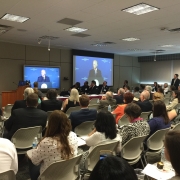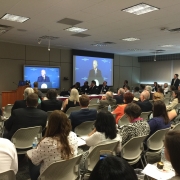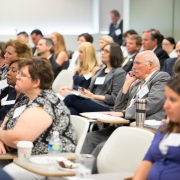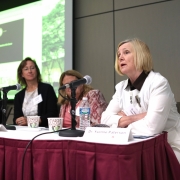
Fox Chase Hosts Cancer Moonshot Summit to Discuss Research Progress
-
Can 10 years of cancer-fighting progress really be accomplished in half the time?

Moonshot Attendees watch live-stream remarks from VP Joe Biden Vice President Joe Biden believes so, and he has challenged researchers and clinicians around the country to double their progress to end cancer as we know it.
In cooperation with the American Cancer Society and the U.S. Department of Health and Human Services, Fox Chase Cancer Center hosted the official Cancer Moonshot Summit for Region 3 — including Maryland, Delaware, Pennsylvania, Virginia, West Virginia, and Washington, D.C. — on Wednesday, June 29, 2016.
More than 100 clinicians, researchers, patients, and experts in the field gathered at Fox Chase for the summit, which was hosted by Wafik El-Deiry, deputy cancer center director of translational research and coleader of the Molecular Therapeutics Program, and included three expert panels and livestreamed remarks from Vice President Biden.
In his remarks, Vice President Biden urged the crowds gathered at summits around the country to push forward in the fight against cancer.
“I firmly believe we can do in the next five years what would ordinarily take 10,” he said. “Think about what this will mean. Time matters, days matter, minutes matter. We’re on the cusp of breakthroughs that can get us there. The goal is to propel us there today. These are breakthroughs that are just beyond our grasp. I really do believe it’s within your power to fundamentally change and turn despair into hope a lot sooner rather than later.”
Following Vice President Biden’s comments, Bert Vogelstein, codirector of the Ludwig Center at the Johns Hopkins Kimmel Cancer Center, delivered his own remarks through a livestream from Johns Hopkins.
“We understand cancer much better than any other disease,” he said. “It’s the perfect time for the Moonshot. Each one of us is optimistic we can defeat the enemy. Can we win this war? Yes, we obviously can. Once a disease is understood, it’s only a matter of time before it can be conquered. The only way to win this war in the immediate future, in the time period of the Moonshot, is to do as much research on prevention and early detection as on new therapeutics.”
Fox Chase also held three panels composed of clinicians, researchers, and patients from Fox Chase and other institutions in the region.

Moonshot attendees listen to panel discussion “Research: The Foundation of Progress” highlighted the importance of basic science discovery in cancer and discussed impediments like flat funding, working-group silos, and the challenges of translating the bench to the bedside.
Panelists agreed that motivating young scientists, changes in university cultures, and problems with getting work funded are all major issues to be addressed.
“I’m watching midcareer investigators be blown up in a climate of not being able to be funded. They’ve gotten a first grant and now can’t get additional grants,” said panelist Jane Azizkhan-Clifford, professor and chair and associate dean for medical student research at Drexel University College of Medicine. “They’re at the precipice of discovery and they are being squelched by lack of funding. The effect on morale is just overwhelmingly negative.”
Just as important as funding is the encouragement provided to young investigators, according to panelist Glenn Rall, director of the Postdoctoral Program at Fox Chase.
“Investment also has to mean empowering and mentoring and nurturing future generations of us,” he said.
“Data Sharing in Precision Oncology” explored data sharing, collaboration, and the potential and challenges due to recent technological advances in multiple testing platforms, liquid biopsies, clinical guidelines, electronic records, and data retrieval and integration.

Moonshot panelist, Dr. Yvonne Paterson A common theme discussed was getting communities to work together to educate the community at large and to create larger population pools for research.
“Our mission is to find people who are genetically predisposed to getting cancer before they get the cancer and find ways to prevent it or ramp up screening to find it at a very early stage,” said panelist Mary Daly, chair of clinical genetics and director of the Risk Assessment Program at Fox Chase. “What I’ve learned over these last 25 years, you really need big data to do this work. Without the ability to do big data, to sequence big data, to store big data, this kind of genetic research would not be possible.”
“Clinical Trials and Patient Advocacy” discussed the challenges of enrolling patients in clinical trials and what institutions and health care teams can change to address the issue.
In particular, panelists noted that their European colleagues have greater success in getting patients into clinical trials and that getting access to information about clinical trials is more difficult than it should be.
“One simple thing would be knowing what trials are open where — what they’re working on, what’s open, what’s closed, and in the rare case I don’t have a trial open, show them where else may have something available,” said panelist Elizabeth Plimack, director of genitourinary clinical research at Fox Chase.
